Java Libraries and frameworks are essential to start your Java project code. Java Libraries will provide any developer with the resources they need to make their projects incredible. So, go ahead and explore what these distinguished libraries have to offer.
Java Libraries: Are you a Java developer looking to increase efficiency and work smarter? You should make use of all accessible resources. Java is a compelling language that comes with a wealth of libraries from which developers can pick.
To help you narrow down your search, we’ve developed a list of must-know libraries – the top 10 Java Libraries any Java Developer should be familiar with! From essential development tools like Apache Log4j 2 and Google Guava to supporting frameworks like Struts2 and BootStrap 4 – there’s something on this list for everyone. With this guide in hand, you’re sure give yourself the best chance at successful coding endeavors.
If you’re feeling overwhelmed by this massive task ahead of you, fear not! Decode Java+DSA 1.0 by Physics Wallah is here to save the day with an in-depth yet concise guide on how to make the most out of your Java experience. Give it a look and see how this course can always stand at your side when it comes to tech courses like programming languages. With this knowledge now in hand, go forth and write some incredible innovative software projects!
Also read: 13 Java Coding Games Will Help You Master Java in 2024
Basic Libraries in Java

Here are some of the libraries used in Java:
1) Java Standard Libraries
Begin with the foundational frameworks and libraries the Java programming language provides. Java Standard Libraries, often overlooked, include robust and functional libraries like java.util, java.lang, java.math, java.net, and java.io/java.nio. These libraries form the cornerstone for building a solid programming base, aiding in understanding third-party libraries effectively.
2) Mockito [Unit Testing Library]
Mockito, an open-source mocking framework, is essential for Java developers proficient in conducting unit tests. With a clean and simple API, Mockito facilitates the creation of test double objects for behavior-driven and test-driven scenarios. Voted as the best mocking framework for Java on StackOverflow, Mockito is a valuable tool in a developer’s testing arsenal.
3) Apache Commons [General-Purpose Library]
Apache Commons, an Apache project, encompasses a range of reusable Java components. This general-purpose library includes modules such as Commons IO, Commons Numbers, Commons Text, Commons CSV, Commons BSF, and Commons Crypto. Java developers can leverage these resources without the need to reference additional sources.
4) Google Guava [General-Purpose Library]
Google Guava is an open-source library with core Java components as an alternative to Apache Commons. Offering advanced features beyond Apache Commons, Guava includes generic classes, string manipulation, I/O operations, caching, and graph libraries. Categorized into basic utilities, Google Collections library, and miscellaneous utilities, Guava stands out as one of the most popular Java libraries.
Also read: Full Stack Java Developer Syllabus (A Comprehensive Guide)
5) JUnit [Unit Testing Library]
JUnit, another unit testing framework, empowers Java programmers to create test cases and execute unit tests. Mastering unit testing tools like JUnit is crucial for bug fixing. JUnit creates new instances of the test class for each test run, emphasizing the importance of creating independent test cases.
6) Jackson [JSON Parsing Library]
Jackson, a widely used JSON parsing library, is renowned for its high performance, lightweight structure, and accuracy. It facilitates the serialization and mapping of Java objects to JSON and vice versa. Jackson is versatile in processing encrypted data in BSV, XML, CBOR, BSON, TOML, and others, supporting various data types and formats.
7) Log4j 2 [Logging Library]
Log4j, the most popular logging library for Java, has seen an upgrade in Log4j 2 to address issues faced in the original framework. With advanced features like improved filters and speed, extensibility, custom log levels, support for JSON, XML, YAML, and asynchronous loggers, Log4j 2 is a powerful tool for managing logging events.
8) HttpClient [HTTP Library]
Used for requesting and retrieving HTTP resources over the network, HttpClient supports both HTTP/1.1 and HTTP/2. It accommodates synchronous and asynchronous programming models, allowing Java developers to make multiple requests with configuration flexibility.
9) JAXB [XML Parsing Library]
Java Architecture for XML Binding (JAXB) is crucial for XML parsing, providing ways to bind XML schemas and Java representation. With features like reduced generated classes, smaller runtime libraries, validation capabilities, and support for Java to XML, JAXB is indispensable for tasks that involve XML functionalities, primarily since the Java Standard Library in Java 9 no longer supports them.
10) DBCP [Database Connection Pool Library]
Database Connection Pool (DBCP) libraries enhance interaction speed for Java developers integrating databases into applications. DBCP, such as Apache Commons DBCP 2, enables connection pooling, saving time and effort by pooling connections rather than creating individual DB connections for each user.
If you’re looking for a comprehensive course that covers all parts of Java, then Decode Java+DSA 1.0 by Physics Wallah is your best bet! You’ll master core concepts like data structures and algorithms, build a strong foundation in fundamentals and practice problem-solving skills with weekly coding challenges – all in one course. So don’t hesitate, take action now to become the very best version of yourself as a Java developer today!
How to Download Java Libraries?
Below are the steps to download Java libraries:
- Decide which library you need for your project. You can find information about popular Java libraries on their official websites, GitHub repositories, or through your project’s documentation.
- Many Java libraries are available on Maven Central Repository or other package managers. You can search for the library on these platforms.
- You can specify the library as a dependency in your project configuration file using a build tool like Maven, Gradle, or Apache Ant.
- If the library is hosted on GitHub, you can visit the repository, go to the “Releases” section, and download the JAR file or the source code.
- If you are using an Integrated Development Environment (IDE) like Eclipse or IntelliJ IDEA, you can add the JAR file to your project’s build path through the IDE settings.
- After including the library, you can verify its installation by importing its classes in your code. The library is successfully added if your IDE doesn’t show any errors.
Also read: Top Java Web Development Technologies You Must Learn In 2023
FAQs
What are Java libraries, and why are they important?
Java libraries are precompiled collections of reusable code modules that provide commonly used functionalities. They are crucial for developers as they eliminate redundancy, save time, and offer tested and efficient solutions to common programming tasks.
How do I use Java Standard Libraries in my projects?
Java Standard Libraries come bundled with the Java Development Kit (JDK). You can use them by importing relevant packages in your code. For example, to use classes from Java.util, include import java.util.*; at the beginning of your Java file.
What is Mockito, and why is it famous for unit testing in Java?
Mockito is an open-source mocking framework for Java. It is popular for unit testing because it allows developers to create test double objects easily. Its clean API simplifies the writing of unit tests, making it a favored choice in the Java community.
What distinguishes Google Guava from Apache Commons?
Google Guava is an alternative to Apache Commons, offering core Java libraries with additional advanced features. Guava includes generic classes, string manipulation, I/O operations, caching, and graph libraries. It is categorized into basic utilities, Google collections library, and miscellaneous utilities.
How does Jackson contribute to JSON parsing in Java?
Jackson is a high-performance JSON parsing library in Java. It facilitates the serialization and mapping of Java objects to JSON and vice versa. Jackson supports various data types and formats, making it versatile for working with JSON data.



